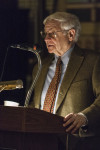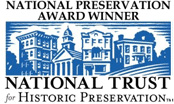On September 29, 2023, the Society presented the 2023 Dick Wolf Lecture with speaker John Rennie Short, School of Public Policy, University of Maryland Baltimore County. Event Photos
Read more…
This lecture, originally scheduled for Friday, March 27, 2020, will not take place as planned. Information on rescheduling will be posted as it becomes available.
Read more…
On Friday, March 29, 2019 at 7 pm, John Hillegass, winner of the 2019 Dick Wolf Prize, presented a lecture on the decision to dismantle the Washington DC streetcar system in favor of buses.
Read more…
The 2018 Dick Wolf Lecture “New Discoveries at the Shotgun House Archaeology Project” was presented at Hill Center on Friday, March 23, 2018.
Read more…
Kelsey Robertson, winner of the 2017 Dick Wolf Prize, presented Historic Districts & Climate Change: examining the vulnerability of the District’s historic districts to sea level rise, Friday, March 24, 2017, 7 p.m., at Hill Center, 921 Pennsylvania Ave SE. Presentation Slides Event photos
Read more…
How to retain affordable housing and its contribution to maintaining character of place
On March 18, 2016 an overflow crowd attended the Hill Center to hear Brook Hill, this year’s winner of the Dick Wolf Memorial Lecture. Event Photos
Read more…
Do we need more objective criteria for evaluating demolition permits for historic properties? That question was addressed in a variety of ways by William B. King at the inaugural Dick Wolf Memorial Lecture on March 27, 2015 at HillCenter. Event Photos
Read more…
The Dick Wolf Memorial Lecture is an annual event to showcase excellence in research and writing on urban planning and historic preservation in the District of Columbia by a student or intern. The winner delivers a presentation and receives a $1,000 prize.
Dick Wolf (1933-2012) was one of the District’s most ardent and effective visionaries. After moving to Capitol Hill in 1964, he worked tirelessly and effectively on community planning (including the Comprehensive Plan), historic preservation, and sound neighborhood development. He served on the CHRS Board for many years, most often as President, and also served on the Committee of 100 of the Federal City. His vision for Washington was of a great, world-class city that houses both the nation’s great institutions as well as families with young children; balances its appetite for massive growth with preservation of the character of its irreplaceable historic residential neighborhoods; and integrates sound, sustained city planning principles, practices and administrative processes into all the city’s business.



